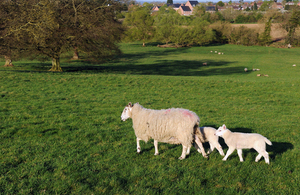Multi-agency investigation into E. coli O157 cases in Lancashire
PHE are investigating cases of gastrointestinal illness after lamb feeding event at a farm shop and outlet village in South Ribble.

Lambs
Public Health England, environmental health officers from across Lancashire and officials from the Animal Health and Veterinary Laboratories Agency are investigating a number of cases of gastrointestinal illness which have occurred following visits to a farm shop and outlet village in South Ribble, Lancashire.
To date we are aware of 11 laboratory confirmed cases of ‘E. coli O157’. Four people have been hospitalised with complications arising from the infection - one of whom has now left hospital and is recovering at home.
All cases had visited a lamb feeding event at Huntley’s Country Store, near Salmesbury in South Ribble over recent weeks. There is no longer any risk to the public as all contact between animals and the public at the premises has now ceased.
Dr Ken Lamden, Consultant in Health Protection from the Cumbria and Lancashire’s PHE Centre said:
Investigations are still on going and all public health measures have been put in place. The owners are co-operating fully and we are working closely with them and with colleagues across health and local authorities.
Symptoms of ‘E. coli O157’ include bloody diarrhoea, which can be serious, or milder forms of the infection which are usually self-limiting and clear within 7 days.
It is believed the outbreak began before Easter. Anyone who visited the lambing event between 29 March and 24 April and who is unwell with diarrhoea, bloody diarrhoea or passing less urine than usual should seek medical advice or contact NHS 111.
Dr Lamden added:
The best protection against ‘E. coli O157’ and most infections is thorough hand-washing. This is particularly important after contact with animals, after going to the toilet, after handling raw meat products and always before eating.
This incident is an important reminder for parents to follow strict hand washing with their families when visiting petting farms or handling animals. Although many parents may carry alcohol gels with them, this should be an addition to hand washing with soap and water and not a substitute.
Ahead of the May Bank Holiday weekend, we urge families to enjoy their farm visits safely by ensuring good hand hygiene after touching farm animals or their surroundings. Outbreaks of gastrointestinal illness associated with contact with farm animals, peak in the spring and summer as this coincides with schools holidays when visits to petting farms tend to be more popular, although outbreaks can occur at other times. We wouldn’t wish to discourage farm visits, but people need to remember that a range of infections can be passed on through contact with animals unless care is taken to avoid them.
It is very important for parents and children to make full use of the washing facilities that are provided at open farms. They should wash their hands thoroughly after contact with the animals, before eating and before putting fingers near their mouths.
Ends
Notes to editors
- ‘Escherichia coli’ (commonly referred to as E. coli) is a type of bacteria that can be found in the intestines of many animals. Some strains can cause illness in people. Usually people suffer from diarrhoea which settles within 7 days without treatment. However some strains can cause haemolytic uraemic syndrome (HUS) which is a serious complication, especially in young children that affects the blood, kidneys and in severe cases, the central nervous system.
- Most people normally carry harmless strains of ‘E. coli’ in their intestine. Both the harmless strains and the strains that cause diarrhoea are acquired primarily through ingestion of contaminated food or water. Person-to-person and animal-to-human transmission is through the oral-faecal route. This is why washing the hands after using the toilet and before preparing food is important as it breaks the cycle of transmission.
- The incubation period is usually 1 to 6 days, with an average of 2 days, but can be longer. Symptoms include diarrhoea which is usually mild and settles within 2 weeks. However, some people may have more serious illness with bloody diarrhoea, abdominal pain, raised temperature and shivering attacks.
- People with ‘E.coli O157’ are advised to rest and drink plenty of fluids. Antibiotics should not be given for this illness. If diarrhoea persists, or if blood or slime is present, people should seek urgent health advice.
- Hand-washing after contact with animals, even domestic pets, is vital. Young children should be supervised when washing their hands, or have their hands washed for them.
- Public Health England’s mission is to protect and improve the nation’s health and to address inequalities through working with national and local government, the NHS, industry and the voluntary and community sector. PHE is an operationally autonomous executive agency of the Department of Health. www.gov.uk/phe Follow us on Twitter @PHE_uk
UKHSA press office: North West centre
Email Northwest-Pressoffice@phe.gov.uk
Phone: 0344 225 1295 option 5 (includes out of hours)
Photo courtesy Shutterstock.